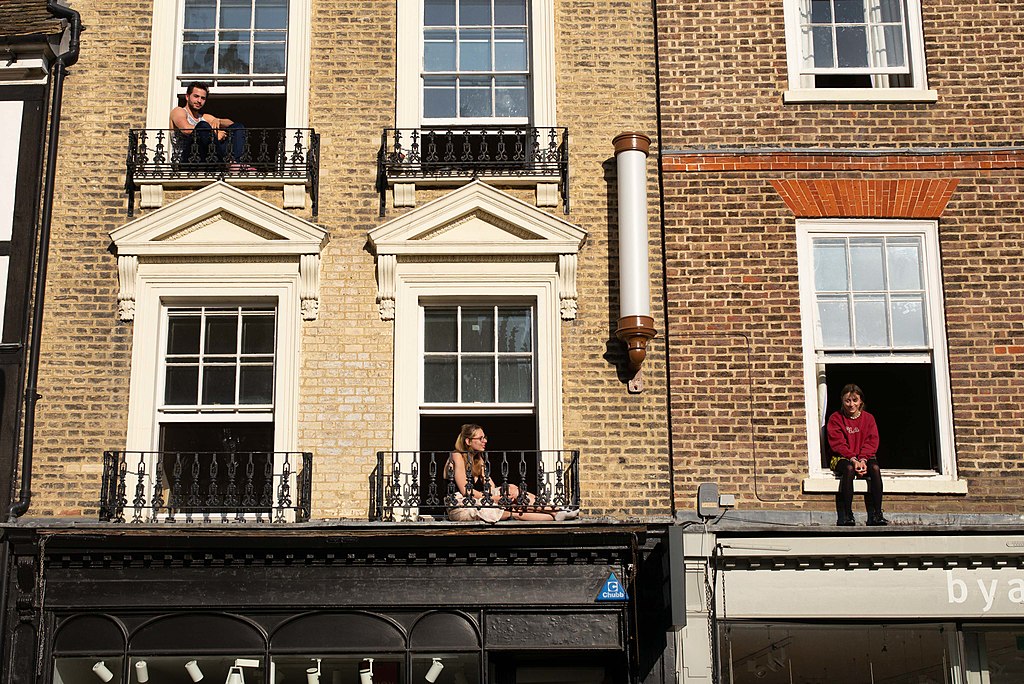
Social distance on Kings Parade. Image: Gyles Glover, CC BY 2.0 https://creativecommons.org/licenses/by/2.0, via Wikimedia Commons
by Elizabeth Dozois
Do you find yourself tearing up when you see videos of people singing to one another from their balconies? Are you moved by the multiple acts of kindness and solidarity we’ve seen over the past few weeks?
Disasters bring enormous suffering, anxiety and chaos – but they also bring some vital gifts: They wake us up from the slumber of everyday routine, for example, and remind us what is important in life. They can help us to extend our sense of what it means to be alive and human. And they offer critical opportunities for course correction.
The two poems below speak to some of the positive outcomes associated with the COVID-19 crisis. The first, Lockdown by Richard Hendrick, speaks to the gifts this disaster has already brought: demonstrations of human solidarity, ingenuity and kindness; enhanced meaning-making; opportunities to slow down and reflect on what really matters; and the nascent beginnings of ecological recovery.
The second poem, An Imagined Letter from COVID-19 to Humans by Kristin Flyntz, speaks to positive outcomes that could emerge from the global health crisis if we are wise enough to use this interruption from the “endless cacophonous broadcast of divisions and distractions” to pay attention to life’s demands and reorganize ourselves in ways that help to mitigate the even larger health crisis we have created: the slow-moving, human-made disaster of ecological destruction and climate change.
I’ve noticed that, of the two poems, this one evokes much stronger feelings in people – especially among those who worry that, by acknowledging the opportunity the COVID-19 crisis presents for course correction, the author is somehow minimizing the suffering that many people are currently experiencing.
However, far more people suffer every day because of the way we’ve structured our social arrangements. And many more will suffer if we do not ‘flatten the curves’ associated with carbon emissions and ecosystem destruction. We can’t look at the COVID-19 disaster in isolation; we have to consider it in the context of broader harm/benefit calculations – and if this crisis finally helps us to wake up to the larger disaster we’re perpetuating, then it will have saved many lives.
Enjoy the poems, reflect on the opportunities, learn as much as you can from this extraordinary event, and please share your insights on the Human Venture Alumni portal – we’d love to hear from you!
Lockdown
Yes there is fear.
Yes there is isolation.
Yes there is panic buying.
Yes there is sickness.
Yes there is even death.
But,
They say that in Wuhan after so many years of noise
You can hear the birds again.
They say that after just a few weeks of quiet
The sky is no longer thick with fumes
But blue and grey and clear.
They say that in the streets of Assisi
People are singing to each other
across the empty squares,
keeping their windows open
so that those who are alone
may hear the sounds of family around them.
They say that a hotel in the West of Ireland
Is offering free meals and delivery to the housebound.
Today a young woman I know
is busy spreading fliers with her number
through the neighbourhood
So that the elders may have someone to call on.
Today Churches, Synagogues, Mosques and Temples
are preparing to welcome
and shelter the homeless, the sick, the weary
All over the world people are slowing down and reflecting
All over the world people are looking at their neighbours in a new way
All over the world people are waking up to a new reality
To how big we really are.
To how little control we really have.
To what really matters.
To Love.
So we pray and we remember that
Yes there is fear.
But there does not have to be hate.
Yes there is isolation.
But there does not have to be loneliness.
Yes there is panic buying.
But there does not have to be meanness.
Yes there is sickness.
But there does not have to be disease of the soul
Yes there is even death.
But there can always be a rebirth of love.
Wake to the choices you make as to how to live now.
Today, breathe.
Listen, behind the factory noises of your panic
The birds are singing again
The sky is clearing,
Spring is coming,
And we are always encompassed by Love.
Open the windows of your soul
And though you may not be able
to touch across the empty square,
Sing.
Fr. Richard Hendrick, OFM, Ireland, March 13th, 2020
Brother Hendrick is a Franciscan monk living in Ireland. He shared the poem on Facebook on March 13, 2020.
An Imagined Letter from Covid-19 to Humans
Stop. Just stop.
It is no longer a request. It is a mandate.
We will help you.
We will bring the supersonic, high speed merry-go-round to a halt
We will stop
the planes
the trains
the schools
the malls
the meetings
the frenetic, furied rush of illusions and “obligations” that keep you from hearing our
single and shared beating heart,
the way we breathe together, in unison.
Our obligation is to each other,
As it has always been, even if, even though, you have forgotten.
We will interrupt this broadcast, the endless cacophonous broadcast of divisions and distractions,
to bring you this long-breaking news:
We are not well.
None of us; all of us are suffering.
Last year, the firestorms that scorched the lungs of the earth
did not give you pause.
Nor the typhoons in Africa,China, Japan.
Nor the fevered climates in Japan and India.
You have not been listening.
It is hard to listen when you are so busy all the time, hustling to uphold the comforts and conveniences that scaffold your lives.
But the foundation is giving way,
buckling under the weight of your needs and desires.
We will help you.
We will bring the firestorms to your body
We will bring the fever to your body
We will bring the burning, searing, and flooding to your lungs
that you might hear:
We are not well.
Despite what you might think or feel, we are not the enemy.
We are Messenger. We are Ally. We are a balancing force.
We are asking you:
To stop, to be still, to listen;
To move beyond your individual concerns and consider the concerns of all;
To be with your ignorance, to find your humility, to relinquish your thinking minds and travel deep into the mind of the heart;
To look up into the sky, streaked with fewer planes, and see it, to notice its condition: clear, smoky, smoggy, rainy? How much do you need it to be healthy so that you may also be healthy?
To look at a tree, and see it, to notice its condition: how does its health contribute to the health of the sky, to the air you need to be healthy?
To visit a river, and see it, to notice its condition: clear, clean, murky, polluted? How much do you need it to be healthy so that you may also be healthy? How does its health contribute to the health of the tree, who contributes to the health of the sky, so that you may also be healthy?
Many are afraid now.
Do not demonize your fear, and also, do not let it rule you. Instead, let it speak to you—in your stillness,
listen for its wisdom.
What might it be telling you about what is at work, at issue, at risk, beyond the threats of personal inconvenience and illness?
As the health of a tree, a river, the sky tells you about quality of your own health, what might the quality of your health tell you about the health of the rivers, the trees, the sky, and all of us who share this planet with you?
Stop.
Notice if you are resisting.
Notice what you are resisting.
Ask why.
Stop. Just stop.
Be still.
Listen.
Ask us what we might teach you about illness and healing, about what might be required so that all may be well.
We will help you, if you listen.
Kristin Flyntz
Ms. Flyntz is the Assistant Editor of Dark Matter, a publication that focuses on “writing and artwork created in response to an age of massive species loss and ecological collapse” .(http://darkmatterwomenwitnessing.com/home.html).
Elizabeth has been engaged with the Human Venture Institute since completing the program in 2004/2005. She works as a consultant in Calgary, helping non-profit and government sectors integrate adaptive learning principles in their efforts to address complex social issues.
